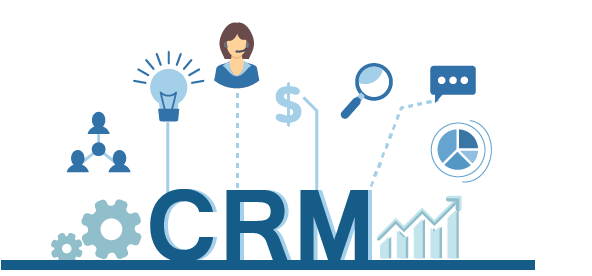Customer Relationship Management, or CRM, is a term for any process, strategy, or tool that helps a business better organize, access, and utilize its customer data. The idea has been around forever. In the 1950s travelling salesperson using a Rolodex and a list of leads was engaging in CRM. In the 21st century, CRM has become synonymous with software and even cloud computing. What used to be in a Rolodex and scribbled down on napkins now lives on a CRM platform.
CRM platforms connect all the departments in a company that are involved with customers. These systems organize the notes, activities, and metrics from every department in one place, from marketing to customer service. With a CRM in place, everyone in the company then has access to real-time customer data. This allows for unprecedented coordination between departments. The end results are time and money savings as well as unmatched customer service.
There are five main benefits of a CRM solution:
1. Customer satisfaction.
Going all the way back to the days of the travelling salesperson, one axiom remains true: a satisfied customer is a profitable customer. CRM platforms help do just that. With the help of CRM software, you can answer your customers’ questions and fill their orders with greater accuracy and speed. This will keep your customers loyal to your business and more likely to recommend your products or services.
2. Data collection.
Data is everything in today’s online world. A great CRM Platform will gather all the information you already have about your customers and put it in one place. Not only that, but it will also generate new data that you will be able to use to increase the likelihood of further sales. The fact that anyone in your organization can use the platform will allow for instant updates to your data set.
3. Turning leads into sales.
The data stored in your CRM often contains valuable sales leads. In the old days, you would have to track down a lead through phone calls and other channels. Now, through data collection, your CRM can be used to generate new leads and even analyze the likelihood of turning those leads into sales.
4. Better targeted marketing.
One of the drawbacks of digital marketing is misplaced or saturated marketing material. Mistargeted marketing often looks like spam emails and annoying SMS messages when they are delivered to the wrong audience. These kinds of missteps could turn a customer off your brand. This is a job for CRM Solutions. A finely tuned CRM system can ensure your customers get the right amount of marketing prompts at the right time.
5. Agility in process management.
A top-level CRM platform is agile and efficient. These are two of the key aspects of 21st-century process management. If a new product or additional software needs to be added to it, the platform should be flexible. Onboarding should be a snap. The system’s agility should facilitate solutions when/if problems arise.





Comments